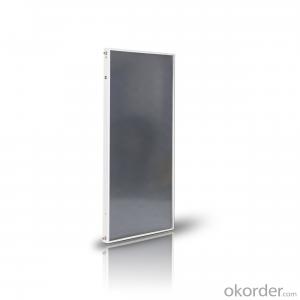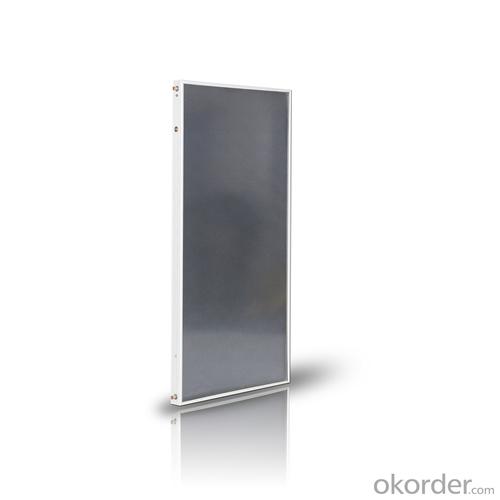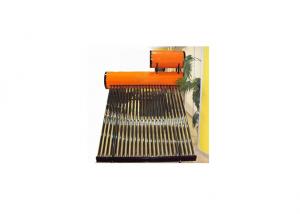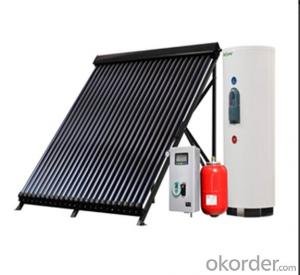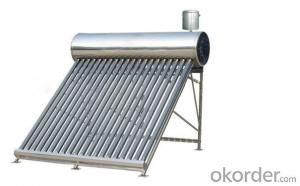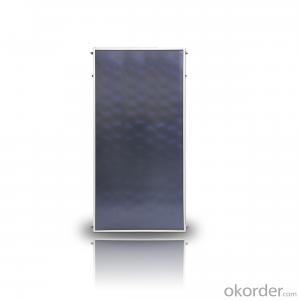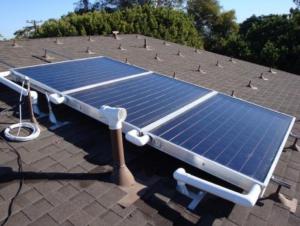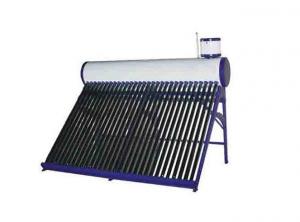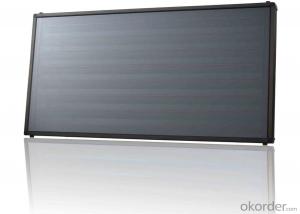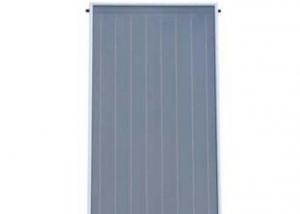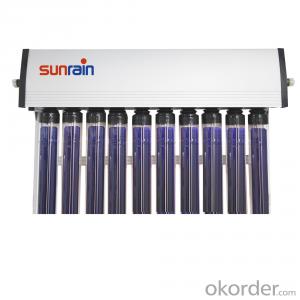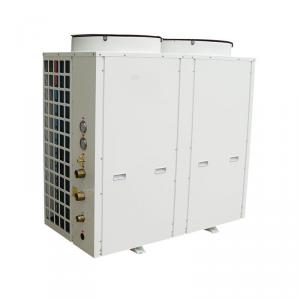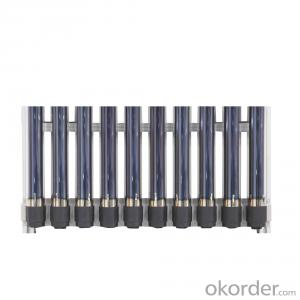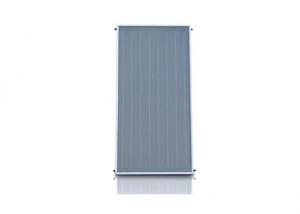Aet Solar Water Heater - Flat Plate Collector FPC1200D
- Loading Port:
- China Main Port
- Payment Terms:
- TT OR LC
- Min Order Qty:
- -
- Supply Capability:
- -
OKorder Service Pledge
Quality Product, Order Online Tracking, Timely Delivery
OKorder Financial Service
Credit Rating, Credit Services, Credit Purchasing
You Might Also Like
| Type | Flat Plate Collector |
| Pressure | Pressurized |
| Circulation Type | Indirect / Closed Loop (Passive) |
| Connection Type | Split |
| Certification | CE, Solar Keymark,AS/NZS2535,4020 |
| Model Number | FPC1200D |
| Recommend region | world wide |
Key points
. Easy installation, long service life. . Good insulation properties. Low decline speed according to environment temperature decline. It's better to be installed in above-zero environment.
. Adjustable, installation will not be affected by angle.
. It can be evacuated in winter for anti-freeze purpose.
. High blue selective coating, full plate laser welding technology, with high absorbing efficiency, operates with 6 bar pressure. Test pressure is 10 bar.
. Laser welding technology. Heat faster, and heat loss is smaller.
- Q: Can a solar water heater be used in areas with limited warranty coverage?
- Yes, a solar water heater can be used in areas with limited warranty coverage. However, it is important to note that having limited warranty coverage may pose potential risks and challenges. In such areas, it is advisable to carefully consider the quality and reliability of the solar water heater, as well as ensure proper maintenance and servicing to mitigate any issues that may arise.
- Q: How does a solar water heater affect the environment?
- A solar water heater positively impacts the environment in several ways. Firstly, it significantly reduces greenhouse gas emissions as it relies on renewable solar energy instead of fossil fuels for heating water. This helps in combating climate change and reducing air pollution. Additionally, solar water heaters conserve energy, as they require less electricity or gas to heat water, resulting in decreased demand for non-renewable resources. Furthermore, solar water heaters minimize water pollution as they do not produce harmful byproducts or waste. Overall, solar water heaters contribute to a greener and more sustainable future for our planet.
- Q: What is the impact of snow or ice on the performance of a solar water heater?
- The performance of a solar water heater can be greatly affected by snow or ice. When the surface of the solar panels is covered by snow or ice, sunlight cannot reach the panels, resulting in a decrease in their ability to convert solar energy into heat. This leads to a decrease in the overall efficiency and performance of the solar water heater. Additionally, snow or ice can block the flow of water through the system. If the water in the pipes or heat exchange fluid freezes, it can cause damage to the system or even shut it down completely. This can result in a loss of hot water supply and reduced functionality of the solar water heater during winter months. To minimize the impact of snow or ice on solar water heaters, several measures can be taken. One commonly used method is to install the solar panels at an angle or tilt, allowing snow or ice to slide off more easily. Moreover, installing a heating element or anti-freeze solution in the pipes or heat exchange fluid can prevent freezing and maintain the system's functionality. Regular maintenance and cleaning of the solar panels are also crucial to ensure optimal performance. Removing snow or ice buildup from the panels and ensuring proper insulation and protection against freezing temperatures are essential steps to minimize the impact of winter weather on the performance of a solar water heater. In summary, snow or ice can significantly reduce the efficiency and performance of a solar water heater. By taking preventive measures such as proper installation, insulation, and regular maintenance, the impact can be minimized, and the system can operate effectively year-round.
- Q: Can a solar water heater be used in areas with high mineral content in water?
- Yes, a solar water heater can generally be used in areas with high mineral content in water. However, the high mineral content may cause scaling and mineral buildup in the system over time, which can reduce its efficiency and require more frequent maintenance and cleaning.
- Q: How does the efficiency of a solar water heater vary based on the climate?
- The efficiency of a solar water heater can vary based on the climate. In regions with ample sunlight and high average temperatures, such as tropical climates, solar water heaters tend to be more efficient as they can harness more solar energy to heat the water. In contrast, in colder climates with less sunlight, the efficiency may be lower as the system may struggle to generate enough heat to warm the water to the desired temperature. However, advancements in technology and the use of insulation can help improve the efficiency of solar water heaters even in colder climates.
- Q: Can a solar water heater be used in areas with limited water availability?
- Yes, a solar water heater can be used in areas with limited water availability. Solar water heaters use sunlight to heat water, rather than relying on traditional water sources. Therefore, even in areas with limited water availability, solar water heaters can still be effective in providing hot water for various purposes. Additionally, some solar water heater systems have the option to store heated water for later use, which can be beneficial in areas where water supply is limited or inconsistent. However, it is important to note that the efficiency and effectiveness of a solar water heater may vary depending on the specific conditions and climate of the area.
- Q: Are there different types of solar water heaters?
- Yes, there are different types of solar water heaters. Some common types include flat plate collectors, evacuated tube collectors, and integral collector-storage systems. Each type has its own design and efficiency, but they all utilize solar energy to heat water for various purposes.
- Q: What is the storage capacity of a typical solar water heater?
- The size and model can cause the storage capacity of a regular solar water heater to fluctuate. Nevertheless, the majority of solar water heaters for residential use possess storage tanks with capacities ranging from 40 to 120 gallons. In contrast, commercial or larger-scale solar water heaters might boast even more substantial storage capacities. It is crucial to understand that the amount of hot water that can be stored and utilized during periods when solar energy is unavailable (such as at night or on cloudy days) is determined by the storage capacity.
- Q: What is the impact of temperature fluctuations on the performance of a solar water heater?
- Temperature fluctuations can have a significant impact on the performance of a solar water heater. Higher temperatures can lead to improved efficiency as more solar energy is absorbed, resulting in hotter water. Conversely, lower temperatures can decrease the heater's effectiveness, as it may struggle to reach optimal operating temperatures. Additionally, extreme temperature fluctuations can put added stress on the system, potentially leading to damage or reduced lifespan. Overall, maintaining stable temperatures is crucial for maximizing the performance and longevity of a solar water heater.
- Q: Has anyone repaired it? What market? Know what to say
- Reply hanging on the tree of the dog's post should be solar water is not hot, and I do not know the specific, I was asked to help a friend. Live near West gate.
Send your message to us
Aet Solar Water Heater - Flat Plate Collector FPC1200D
- Loading Port:
- China Main Port
- Payment Terms:
- TT OR LC
- Min Order Qty:
- -
- Supply Capability:
- -
OKorder Service Pledge
Quality Product, Order Online Tracking, Timely Delivery
OKorder Financial Service
Credit Rating, Credit Services, Credit Purchasing
Similar products
Hot products
Hot Searches
Related keywords
